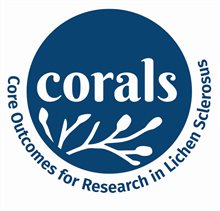
Disease State: Lichen sclerosus
Background
Genital lichen sclerosus (LS) is an inflammatory skin condition that occurs in men, women and children. It is believed to affect at least 1% of women. The prevalence in men and children is unknown. In women, 3-5% go on to develop vulval malignancy, and treatment may reduce this risk. In addition, LS impacts psychosocial and sexual well-being. Published interventional randomized controlled trials are of poor methodological quality and difficult to combine in meta-analyses. This is partly due to lack of validated and agreed upon outcome measures to assess treatment response.
CORALS is a multistakeholder collaboration led by a steering group comprised of 13 health professionals, patients and researchers.
Project Goal
CORALS aims to establish a COS (Core Outcome Set) for interventional trials in LS. To date, consensus on the core domain set has been achieved. This involved an initial 3-stage delphi consensus process to shortlist outcome domains with 199 stakeholders from over 20 countries. Subsequent virtual consensus meetings were attended by 15 patients, 21 health professionals and 6 researchers from 13 international locations.
We will now proceed to develop core instruments for the final COS.
Project Lead
Rosalind Simpson

Rosalind Simpson

Key Project Team Members:
(see CORALS - The University of Nottingham for full details of steering group)
Patient Representatives:
Suzanne von Seitzberg

Jaclyn Lanthier

Suzanne von Seitzberg

Jaclyn Lanthier

Clinical Representatives:
Ione Bissonnette

Gudula Kirtschig

Gitte Vittrup

Amanda Selk

David Foster

Angelo Augenti

Stefano Lauretti

Martin Promm

Ione Bissonnette

Gudula Kirtschig

Gitte Vittrup

Amanda Selk

David Foster

Angelo Augenti

Stefano Lauretti

Martin Promm

Researchers:
Kim Thomas

Kim Thomas

C3 Methods Partner:
Jan Kottner

Executive Committee
Contact:
Rosalind Simpson
corals@nottingham.ac.uk
CORALS - The University of Nottingham
Publications:
Foster DC, Stockdale CK, Simpson R, Kirtschig G. Core Outcome Sets for Clinical Trials and Observational Studies in Vulvovaginal Disease. J Low Genit Tract Dis. 2017;21(3):163-165.
Updated on Date May 1, 2022
